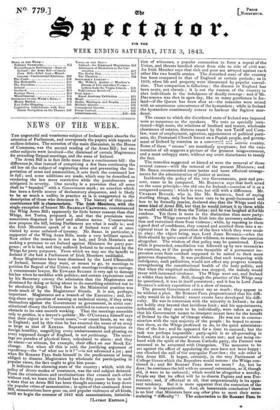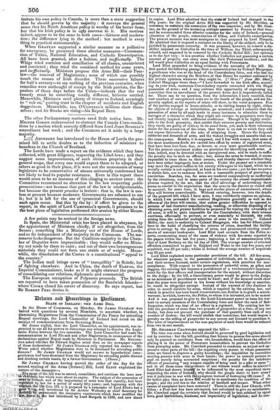NEWS OF THE WEEK.
TEE ungrateful and wearisome subject of Ireland again absorbs the
attention of Parliament, and overspreads the papers with reports of endless debates. The occasion of the main discussion, in the House of Commons, was the second reading of the Arms Bill ; but two other subjects were involved—the dismissal of certain Magistrates for attending Repeal meetings, and the state of Ireland. The Arma Bill is in fact little more than a continuance bill : the differenceis; that instead of comprising a few lines continuing the old law 011 the subject of registering arms and preventing the im-
portation of arms and ammunition, it sets forth the continued law in full ; and some additions are made, which may be described as
Tendering the law more restrictive while the punishments are mitigated in severity. One novelty is a provision that all arms shall be "branded" with a Government mark ; an exaction which has been a fertile source of declamatory eloquence, and is likely to be as much a nullity in practice as it. is exaggerated in the description of those who denounce it. The history of this quasi-
continuance bill is characteristic. The Irish Members, with the single exception of honest Mr. SHARMAN CRAWFORD, countenanced the Whig Arms Bill; apparently for little better reasons than that
Whigs, not Tories, proposed it, and that the provisions were sometimes disguised in brief and allusive terms. Conservatives now propose the bill, letting Parliament see what it really is ; and the Irish Members' speak of it as if Ireland were all at once
visited by some unheard-of tyranny. Mr. SHEIL in particular, a supporter of the Whig Arms Bills, made a very brilliant speech.
Now either the measure is not so bad, and Irish Members are making a pretence to set Ireland against Ministers for party pur- pmes ; or it is bad, and they suffered Ireland to be enslaved by the Whigs for party purposes. From which we may see the benefit to Ireland if' she had a Parliament of Irish Members undiluted.
Some Magistrates have been dismissed by the Lord Chancellor of Ireland, because they went, or meant to go, to meetings to petition for Repeal of the Union ; such meetings tending to outrage.
A consummate lawyer, Sir EDWARD SUGDEN is very apt to damage his law when be meddles with politics; and certain expressions used
by his Secretary convey the admission that the Magistrates are dismissed for doing or being about to do something admitted not to be absolutely illegal. That flaw in the Ministerial position was made much of by the Magistrates' friends. It is not, perhaps, important. Magistrates are a branch of the Executive ; and, let- ting alone any question of warning or technical nicety, if they array themselves against the Government as government, in strict con- stitutional theory the Government is entitled to remove an executive obstacle to its own smooth working. That the meetings assemble
only to petition, is a lawyer's quibble : Mr. O'CONNELL himself says
that their object is to "count noses,"—or count heads, as we say m England; and by this time he has counted the noses of an army
as large as that of XERXES. Repeated chuckling invitation to foreign hostility, magnifying every embarrassment and gloating on every supposed danger of England, is not petitioning. The meet-
ings are parades of physical force, calculated to alarm : and they do alarm—as witness, for example, their effect on our Stock Ex- change. But when all this is said, the justifying argument of
expediency—the "of what use is it?"—is not advanced a jot ; and when Sir ROBERT PEEL finds himself in the predicament of being obliged to dismiss Magistrates by wholesale for participating in popular views, the fact ought to give him pause.
It indicates the alarming state of the country ; which, with the policy of divers modes of treatment, was the real subject debated. From the criminations and recriminations that crossed each other Without end, we learn that Ireland has for fifty years been in such a state that an Arms Bill has been thought necessary to keep down the popular crime of assassination ; in spite of that continued Arms Bill, assassinations have gone on, and popular violences of all kinds, until we begin the summer of 1843 with assassinations, intimida- tion of witnesses, a popular commotion to force a repeal of the Union, and threats bandied about from side to side of civil war. An Irish Member says that rich and poor are arrayed against each other like two hostile armies. The disturbed state of the country has been compared to that of England at certain periods ; as in 1819, when life and property were threatened by popular convul- sion. That comparison is fallacious : the disease in England has been acute, not chronic ; it is not the custom of the country to abet individuals in the indulgence of deadly revenge : and if Mr. DRUMMOND was shot in open day, like so many gentlemen in Ire- land—if the Queen has been shot at—the assassins were seized with an unanimous concurrence of the bystanders ; while in Ireland the bystanders unanimously concur to harbour the fugitive mur- derer.
The causes to which the disordered state of Ireland was imputed were as numerous as the speakers. We note as specially men- tioned—bigh rents, the relations of landlord and tenant, wholesale clearances of estates, distress caused by the new Tariff and Corn- law, want of employment, agitation, appointment of political parti- sans, the Protestant Church forced on a Popish people, and govern; ii ment of Ireland by coercion as a conm,t7..d... aercc country.
Some of these " causes" are manifestly symptoms; but the enu- meration of all suggests a picture of the grossest misgovernment, and a most unhappy state, without any overt disturbance to testify the fact.
The remedies suggested or hinted at were the removal of those several causes—with the removal of the present Ministers; and Mr. SHEIL recommended some better and more effectual arrange- ments for the administration of justice at assizes.
Incidentally the policy of the two Governments, past and pre- sent, came to be compared. Mr. ROEBUCK says that both acted on the same principle—the old one for Ireland—coercion of it as a conquered country : which is true, but still with a difference. Mr. CHARLES BULLER, who is, like Mr. ROEBUCK, fond of saying startling things, only he has more care to be good-humoured an less to be formally precise, declared also that the Whigs used this same kind of Arms Bill, but that he would intrust it t9 them while he would withhold it from the Tories: and he was laughed t &This candour. Yet there is more in the distinction than mere party- spirit. The Whigs coerced the Irish into the necessary subordina- tion and restrained them from violence ; while, by reposing in them a good deal of confidence, they coaxed and soothed them into a re- ciprocal trust in the protection of the laws which they were made to obey; the cbject being, says Lord JOHN RusszeL—when the Irish should be quite cured of their wildness, to remove the coercion altogether. The wisdom of that policy may be questioned. Even while it proceeded, conciliation was followed up by new necessities for coercion, as if the people were incapable of a permanent im- pression even from conduct supposed to be suited to their more generous disposition. It was predicted, that such tampering with indulgence, such palliatives, would not effect any progress towards strengthening the constitutional health of the body politic, and that when the empirical medicine was stopped, the malady would recur with increased virulence. The Whigs went out, and Ireland is wilder than before. Still, though the practice of the Whigs may be questioned, it was in itself consistent ; and it has in Lord Joao- RusseLe's solemn exposition of it a show of reason. The present Government cannot say as much : they appear to be without a plan. Sir ROBERT PEEL prognosticated that his diffi- culty would lie in Ireland : recent events have developed his diffi- culty. He was in connexion with the minority in Ireland ; he did not boldly step beyond that invidious limit i • and his appointments, defensible as they seem to be individually, were taken as gages that his Government meant to interpret recent laws for the benefit of Ireland by the light of Orange wishes. He was not in commu- nication with the vast majority of the people : he hoped to accus- tom them, as the Whigs professed to do, to the quiet administra- tion of the law ; and be appeared for a time to succeed; but the task was perhaps impossible : party-spirit is so all-pervading in Ireland, that it is presumed where it exists not ; and not being im- bued with the spirit of the Roman Catholic party, the Premier was assumed to be saturated with Orangeism. The measures to be set against the effect of appointing the men have not been happy : one clinched the nail of the unpopular Poor-law ; the sole other is this Arms Bill. It began certainly, in the very Parliament of College Green which the Itepealers would restore: the Whigs con- tinued it ; and Sir ROBERT PEEL does no more ? Ay, but he does: he continues the bill with an unusual ostentation, as if, though old, it were to be enforced ; which would be altogether a novelty. People say that its effect will be to disarm Papists and arm Pro- testants: and, if effectual at all, that unquestionably is its appa- rent tendency. But it is more apparent that the execution of the measure is impracticable. And, oh lamentable conclusion I there is no hint that Ministers have any other plan to meet their accu- mulating "difficulty"! The exhortation to Sir ROBERT PEEL to
imitate his own policy in Canada, is more than a mere suggestion that he should govern by the majority : it conveys the general sense that his North American policy is worthy of his better fame, but that his Irish policy is in ugly contrast to it. His motives indeed, appear to be the same in both eases—fairness and modera- tion; the difference lying in the method : but method is every thing in practical statesmanship.
When GRATTAN supported a similar measure as a palliative for emergency, he presented three ulterior measures—Commuta- tion of Tithes, National Education, and Catholic Emancipation. All have been granted, after a fashion, and ineffectually. The Whigs tried coercion and conciliation of all classes, unconvicted and convicted ; they tried the combined method for some years, and ineffectually. Ministers propose this Arms Bill—their Poor- law—the removal of Magistrates ; none of which can possibly touch the causes of Irish disorder. These successive failures for half a century—to say nothing of the previous centuries, when remedies were unthought of except by the Irish patriots, the Re- pealers of those days before the Union—indicate that the real remedy must be something totally different, hitherto untried. Meanwhile, Ministers send plenty of troops to Ireland, seemingly to " rub on," putting trust in the chapter of accidents and English doggedness. Meanwhile, too, O'CONNELL'S millions show them- selves ; and his Stocks are rising—his Repeal Rent.



























